The days of great star-coach partnerships are largely gone from the NBA. Has something been lost?
Steve Kerr, ever the statesman, won’t say which team or which player the Warriors chose to torment one fine evening back in January—only that he saw a chance to unleash Stephen Curry, one of the greatest offensive weapons in basketball history, on some poor, overmatched defender.
“We wanted to pick on a certain matchup,” Kerr recalls. “And so the first four or five minutes of the game, we said, ‘Let’s run pick and roll against this guy for five straight minutes.’ ”
For five straight minutes, Curry feasted, scoring at will. It all worked brilliantly … except for one problem: The rest of the Warriors drifted out of the offense, out of sync with each other. “We sort of lost traction with the game itself,” Kerr says. “It was not the right strategy.”
It prompted a postmortem between Kerr, the Warriors’ decorated head coach, and Curry, their franchise star, ending, Kerr recounts, with this shared verdict: “With this team, we’ve got to find a better balance.” Lesson learned. Strategy altered. Discussion concluded. But the conversation never stops.
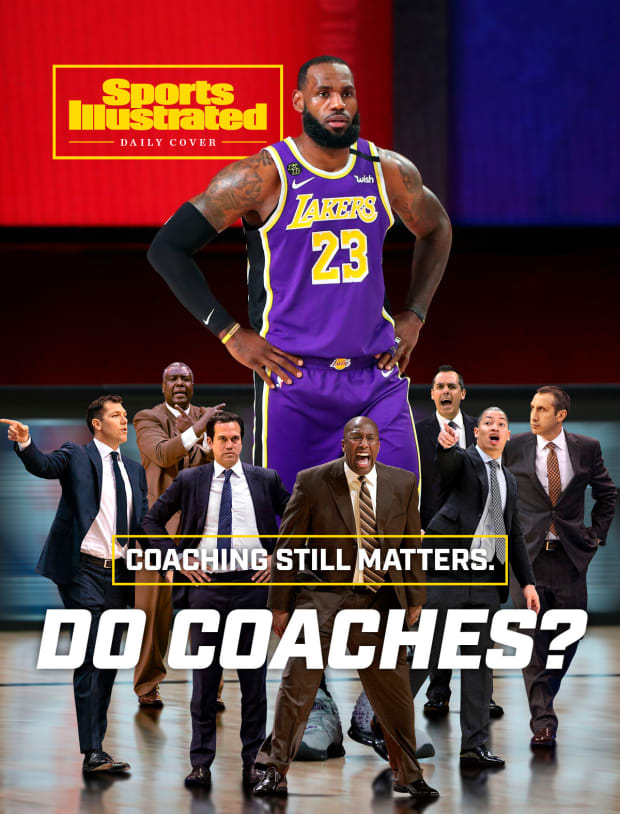
Across seven seasons, through championship runs and Finals collapses, through Kerr’s debilitating back troubles and Curry’s broken hand, through the exhilarating rise and dizzying fall of a historic superteam, through joy and frustration and grief and everything in between, they have leaned on one another, confided in each other, discussed everything from parenting to golf, Black Lives Matter to the box-and-one.
They can read each other’s moods. They know how the other thinks. Like an old married couple, they can practically finish each other’s sentences.
“They’re two very similar people,” says Ron Adams, the dean of the Warriors’ coaching staff and a 29-year veteran of NBA huddles. “Both of their lives are marked by a certain kindness and a humbleness and a caring about other people.”
Everything the Warriors are celebrated for—their playing style, their basketball values and, yes, their joy—begins with Steph and Steve, with Curry and Kerr, with a “mutual respect and admiration” (Curry’s words) and with a bond that “transcends” basketball (Kerr’s words).
“We will definitely stay in touch after we’re both retired from this,” Kerr says.
“Absolutely,” Curry responds when the quote is relayed.
Theirs is a familiar partnership, the latest iteration of a model that dates back to the earliest days of the NBA and threads through nearly every era and the league’s greatest dynasties: from Bill Russell and Red Auerbach in the 1960s, to Magic Johnson and Pat Riley in the 80s, to Michael Jordan and Phil Jackson in the 90s, to Tim Duncan and Gregg Popovich in the 2000s—and of course, to Jackson again with Shaquille O’Neal and Kobe Bryant.
Their achievements are legendary, their names and biographies tightly woven. You can hardly mention Magic without Riles, Timmy without Pop, Isiah Thomas without Chuck Daly, Hakeem Olajuwon without Rudy Tomjanovich.
And you cannot tell the story of the Warriors’ dynastic run without Curry and Kerr—though they just might be the final avatars of this once-standard archetype. The model is fast eroding in the NBA’s Player Empowerment Era, undermined by superstar mobility, coaching instability, evolving power dynamics and shifting sensibilities on the notion of “loyalty” in professional sports. Simply put, today’s superstars and coaches don’t stay together long enough to forge those deeper bonds.
LeBron James won four championships over the last decade, with three franchises and three head coaches: Erik Spoelstra (Heat), Tyronn Lue (Cavaliers) and Frank Vogel (Lakers). Kawhi Leonard won his first title with Popovich in San Antonio, grabbed a second ring with Nick Nurse in Toronto, then joined the Clippers, where he’s trying to replicate the magic with Lue. Kevin Durant won two titles with Kerr, then decamped for Brooklyn, to try winning with Steve Nash.
Coaching still matters, but coaches seem like an afterthought. Perhaps even a bit diminished. The great partnerships of the past were built on trust and communication, and forged over years. It’s how winning cultures take root—the star and coach amplifying one another, setting expectations for everyone else. What happens when that bond disappears? Does culture go with it? Do dynasties disappear? Have today’s stars lost something essential?
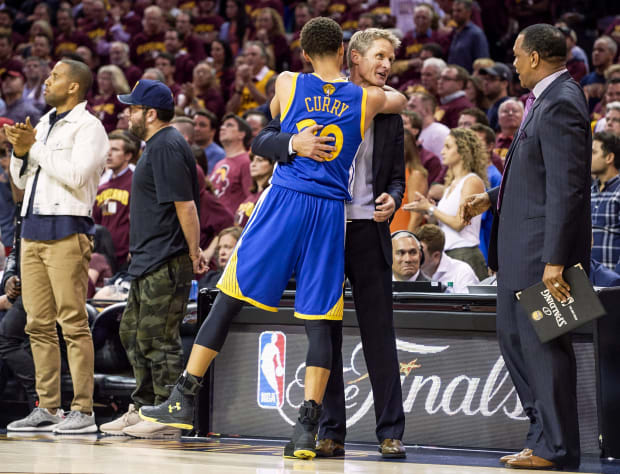
"We’re living in a different time,” says Mavericks head coach Rick Carlisle, who enjoyed 11 seasons—and a tight bond—with Dirk Nowitzki, winning a championship together in 2011.
Carlisle has been coaching in the NBA for 30 years, after five as a player, and he sees how dramatically the dynamics have changed in the last 10, with All-Stars regularly hopscotching across the continent. “It’s a constantly moving kaleidoscope of situations,” Carlisle says, “and it’s as great a challenge as we’ve ever had.”
Of all the superstars to win multiple titles in the 2010s, only Curry has done so with one coach— and stuck with him—sharing with Kerr a journey in which the Dubs evolved from dark horse contenders to surprise champions, set records for regular-season dominance (73 wins) and Finals flops (that blown 3–1 lead), morphed from cuddly underdogs to despised superteam and back to cuddly underdogs after a wave of retirements, injuries and Durant’s defection.
“We’ve kind of seen every piece of success and failure together,” Curry says of Kerr. “I can’t speak for other guys’ experience, but I love the fact that I've experienced every piece of the NBA journey with one coach and one staff, give or take, and that's given me a lot of peace in terms of what this new challenge is—of trying to get back there.”
So when the Warriors misfire—or a strategic hunch backfires, as it did that night in January—their star and coach can quickly course-correct, with full faith in each other. Curry and Kerr have arguably needed each other now more than ever, both for basketball and sanity preservation. Klay Thompson, Curry’s backcourt soulmate, has missed the last two seasons because of injuries. Draymond Green remains a defensive ace, albeit no longer an All-Star. The rest of rotation this season was populated by castoffs (Andrew Wiggins), rentals (Kelly Oubre Jr.), a Curry in-law (Damion Lee) and a raw rookie (James Wiseman).
A year ago, Kerr and Curry had their first losing season together—15 wins, 50 losses—with Curry playing just five games because of a broken hand. This season, Curry summoned his 2016 MVP spirit, powering the Warriors to a 34–33 record while keeping their postseason hopes alive.
The challenges have been steeper than ever, the outside criticism louder than ever, and their bond perhaps as important as ever.
“I look forward to seeing Steph every day,” says Kerr—the rare coach who could say that about the same superstar, every day of every season, for the last seven years.
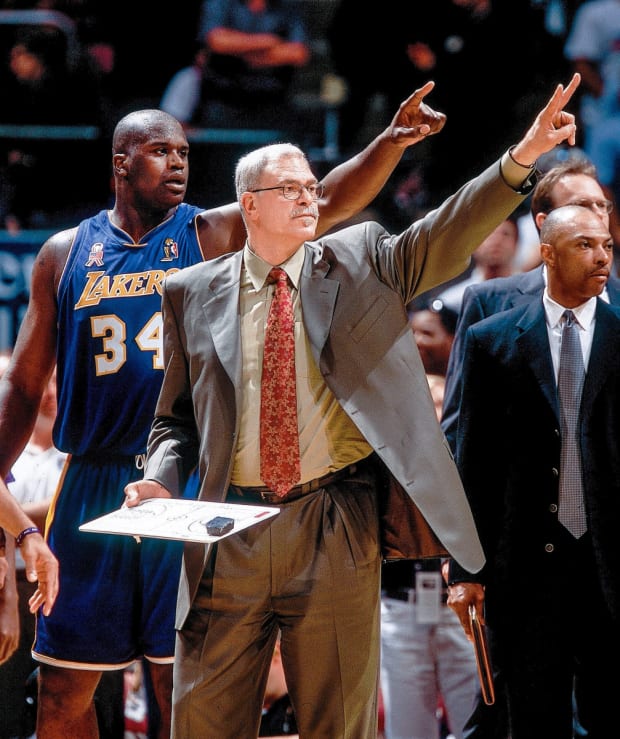
Once upon a time, NBA stars openly coveted the best coaches. Demanded them, even.
Shaquille O’Neal begged the Lakers to hire Phil Jackson long before Jackson arrived in 1999. Kobe Bryant wanted Jackson, too, in no small part because Jackson had coached his idol, Michael Jordan.
It was one of the few things the two Lakers stars agreed on—when they weren’t fighting, feuding or sniping.
“Phil had something that we didn’t have before—a guy with a qualified résumé,” O’Neal says. “I knew that if he came to the team, with his résumé alone, that was gonna bring guys to a certain level.”
Jackson arrived with an abundance of gravitas, an abundance of rings (six) and a structured offense (“the triangle”) that required the Lakers’ warring stars to cooperate. Sure, they still sniped and feuded, but Jackson held it all together—and three straight championships followed.
“Him coming to L.A. was the best thing to happen to my career,” O’Neal says. “Because I probably could have got one (championship). But I don't believe we could have got three in a row with anybody else.”
Their five-year run is also remembered, of course, for the perpetual clash of oversized personalities—not just Bryant vs. O’Neal, but Bryant vs. Jackson or Jackson vs. O’Neal, or everyone vs. everyone. It was equally chaotic and glorious, and it probably ended sooner than it should have, with Jackson and O’Neal departing in 2004.
But it did last a half-decade—long enough to build (and rebuild) the trust and understanding that could sustain the Lakers through the rough spots. The longevity mattered. Relationships need time. They might have all been sick of each other by the end—to the point where Jackson, in his book, would label Bryant “uncoachable”—but those bonds endured, paving the way for Jackson to return to the Lakers and guide Bryant to two more championships, in 2009 and 2010.
“Phil is like a father figure,” Bryant said of Jackson in a 2019 interview, during which he also called Jackson “a genius in every sense of the word, in how he sees the game, how he sees the spirituality of the game.”
That mix of reverence, loyalty and affection mirrors O’Neal’s feelings for Jackson, which in turn echo what Jordan felt for Jackson during the 1990s, when they were racking up titles. One of the first scenes in last year’s popular Bulls documentary, the Last Dance, is Jordan pointedly declaring, in 1997, “I will not choose to play for another coach”—a warning to Bulls management, amid speculation that Jackson would not be retained beyond the 1997–98 season. Jackson was indeed let go after the Bulls won their sixth title—and Jordan retired.

More than a decade earlier, Isiah Thomas drew a similar hard line with the Pistons to save Chuck Daly from being fired in the midst of the 1985–86 season. Thomas was 24 then, a perennial All-Star but not yet a champion, and he greatly valued Daly’s leadership. As the story goes, Thomas appealed directly to Pistons owner Bill Davidson, who agreed to a reprieve.
The Pistons would go on to win titles in 1989 and 1990, cementing Thomas and Daly as legends. Daly was elected to the Hall of Fame in 1994, and six years later he stood as the presenter for Thomas’s induction.
“I never would have became the champion and player that I became, had Chuck not been my coach,” Thomas says.
It’s a common theme. O’Neal and Bryant, by their own assessment, needed Jackson to summon the best versions of themselves, to become champions. So did Jordan, who was widely regarded as a selfish gunner until Jackson arrived and persuaded him to embrace the triangle—a system Jordan initially mocked as an “equal-opportunity offense.”
Not every dynasty was built on this model, nor has every decorated superstar shared a singular bond with one coach. Larry Bird is the most glaring exception, having led the Celtics to three titles in the 1980s, one with Bill Fitch and two with K.C. Jones.
But there’s a long history of NBA stars’ finding their best selves after finding the right coach.
Hakeem Olajuwon was a perennial All-Star under Fitch and later Don Chaney. But his best years came with Rudy Tomjanovich, who after nearly a decade as a Rockets assistant was promoted to the head job in 1992. Tomjanovich persuaded Olajuwon to pass more, while also granting him the freedom to play a complete inside-outside game. Earlier coaches, Olajuwon felt, had pigeonholed him as a conventional low-post scorer.
“I always wanted to play freestyle basketball, to be able to create, and play the way I played in the summertime,” Olajuwon says. “When Rudy T got the coaching job … he trusted me. He allowed me to explore and be myself, and play the way I know is most effective.”
Olajuwon powered the Rockets to the championship in 1994—his 10th season, and Tomjanovich’s second full season as head coach. They won it all again the next year. All told, they spent 16 seasons together in Houston. And this month Tomjanovich earned his induction into the Hall of Fame, with Olajuwon as one of his presenters.
“It’s a lifetime relationship,” Olajuwon says.
Outside of Curry, when was the last time an active NBA star said that about a coach? Or demanded a specific head coach? Or expressed the kind of reverence that Thomas does for Daly, or O’Neal does for Jackson? Would any current player-coach duo be described as “soul mates”—as Duncan and Popovich were by Spurs executive R.C. Buford?
“We were so fortunate to be exposed to some of the true geniuses of the game,” Thomas says of earlier generations. “And unfortunately, everyone doesn't get to experience what a lot of us had the chance to experience. … In our league now, how many of the coaches are guaranteed to walk into the Hall of Fame, as coaches? I don't know.”
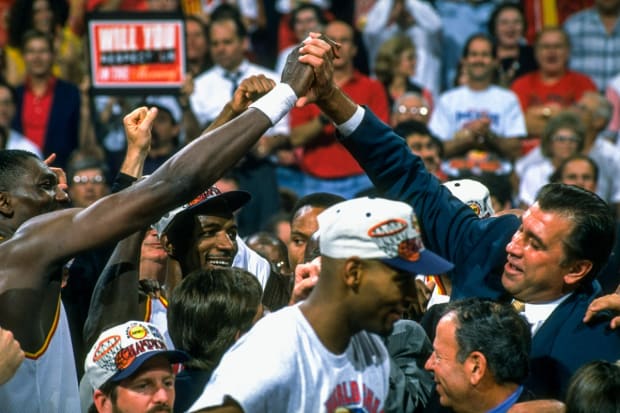
NBA coaches are still good. Some are even great.
Popovich is an NBA icon, now in his 25th year as the Spurs’ chief culture-setter. Carlisle, Spoelstra, Kerr and Doc Rivers are universally respected. Players praise Tyronn Lue’s play-calling, Brad Stevens’ creativity and Monty Williams’ leadership. There’s no shortage of knowledge or acumen.
They just don’t have the same standing, or wield the same influence, generally speaking, as their predecessors. “Only one guy left,” says O’Neal, “and that’s Gregg Popovich.”
Through much of NBA history, the head coach stood as the ultimate authority—the one who dictated roles, set standards and used playing time as a cudgel. Many were towering figures in their own right—Riley, Daly, Jackson, Auerbach, Jerry Sloan. You could call it the Great Man Theory of NBA coaching. And you could say that model is outdated, even obsolete. Few coaches today have the standing or the job security to publicly call out their stars (as Jackson and Popovich routinely did), or bench them as a disciplinary measure.
“The times maybe have changed to the point where it's not going to ever be that way,” says author Bob Ryan, who has covered the NBA for 50 years, starting with the Russell-Auerbach Celtics in 1969. “I think the nature of the coaches themselves, they’re not that kind of personalities. They’re all more technicians than they are the old concept of the ‘leader.’ ”
Indeed, today’s NBA head coach is more collaborator than boss—an orchestra conductor, not a drill sergeant. Today’s stars, by virtue of their wealth and talent, and the ability to take that talent anywhere, wield more influence than ever.
“The coach’s role in this league is no longer that of the old taskmaster,” says Adams. “The real essence of coaching right now is that human dynamic of bringing people together, getting your best players to play freely and well and keeping the lines of communication open.”
For all the technical acumen of a Frank Vogel or a Nick Nurse—who coached the two most recent champions—no one would view them as larger-than-life figures in the way Daly or Riley were once revered. The players are the game.
“They don't have that kind of impact,” O’Neal says of today’s coaches, “because the money is far greater than what it was. So you've got a (player) making $300 million, he's not listening to anybody.”
Coaches are making more than ever, too, but recent trends have cast them in a different light. If James can skip from town to town, merrily collecting titles wherever he lands, it diminishes any sense of the coach being essential. Put another way: We’ll never think of Duncan without Popovich, or Jordan without Jackson; but when we think of James, we might never think of coaches at all.
“I don't think there will ever be that type of camaraderie between a coach and a player again,” O’Neal says.
Does it matter? If it’s only about wins and losses and stats and ringzzz, then perhaps not. But to the extent that sports is about the journey—the struggles and triumphs and shared experiences, the friends we made along the way—then something has indeed been lost, albeit something intangible and sentimental.
NBA stars have more autonomy than ever, which is surely a net positive—for them. The freedom to form their own superteams has helped elevate their games, and burnished their resumes. But that mobility comes at a cost for coaches, who depend on elite talent to prove their own worth—and frankly, to provide job security. As a historical matter, today’s best coaches might never collect the wins or the hardware to place them alongside Auerbach or Jackson, because the superstars won’t stick around long enough to fill the résumé.
Would Nurse have two rings by now if Leonard had stayed? Would Spoelstra have another ring or two if James had stayed? Would Lue still be coaching the Cavaliers had James stuck around for a rebuild?
Without the rings, there is no legend, no aura, no gravitas—the qualities that O’Neal so admired in Jackson.
“I gained knowledge,” O’Neal says, “from one of the top basketball coaches ever to coach.”
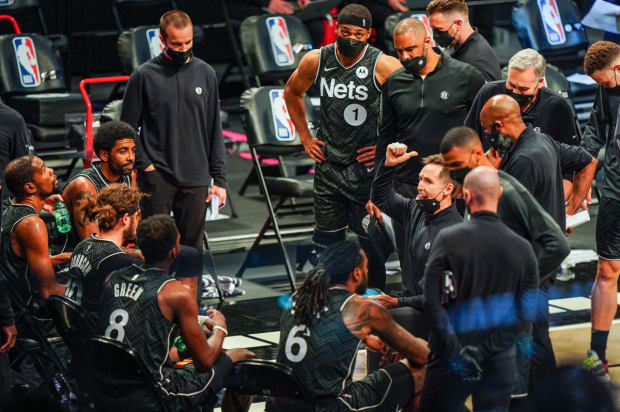
The truth is, Stephen Curry wasn’t thrilled about Steve Kerr’s arrival in 2014. In fact, he was bitter—though his emotions had nothing to do with Kerr.
Curry had grown close to coach Mark Jackson over their three seasons together. The Warriors were coming off a 51-win season, their best in decades. Everything seemed headed in a positive direction. Then Jackson was fired. And Kerr? He’d never coached a game. Curry just knew him as a TNT commentator—and the guy who’d knocked down a few famous shots playing with Jordan back in the 1990s.
“Coach Kerr coming in on, honestly, some very shaky ground,” Curry says, “because I wasn’t a fan of Mark getting fired.” He also knew there was nothing he could do about it. “I can't sit and sulk and ruin Coach Kerr’s experience with me as the point guard moving forward, because I’m just over there pissed off about Mark. It’s not his fault that he’s the head coach now.”
So Curry kept an open mind. And Kerr quickly won his respect, with the same traits that bond them today: humility, honesty, candor.
It happened in Kerr’s first address to the team, when he effusively praised all the work Jackson had done to establish the Warriors as a winner. “He came in with a very kind of humble stance on: Mark did an amazing job for three years and turned us into a really good defensive team. We have playoff experience,” Curry recalls. “And he wanted to make some subtle tweaks that could hopefully get us over the hump, but it was about the players.”
As a basketball matter, their relationship vaguely mirrors some of the great pairings of the past, with Kerr’s serving as the coach who inherits an All-Star and helps him unlock another level—as Phil Jackson did with Jordan, Daly with Thomas, Tomjanovich with Olajuwon. The Warriors were already strong defensively, thanks to Mark Jackson’s work. Under Kerr, their offense leapt from middle-of-the-pack to elite, powering the Warriors all the way to the championship in his first season. Curry won the first of his two MVP awards.
Along the way, Kerr and Curry quickly realized they shared the same basketball values: ball movement, selfless play and an inclusive approach that maximized everyone, which birthed the Warriors’ “Strength in Numbers” slogan that first season.
“Steph just sets the tone for the whole organization, and he allows me to coach,” Kerr says. “And he does it because he embodies the values that are important to me. As a coach, for you to really make an impact on a team, your values have to come alive.”
In their earlier years, that meant Kerr could criticize Curry in a film session with the confidence that he would take it constructively. More recently, with so many of the Warriors’ trusted veterans having retired or moved on, Curry has assumed the elder statesman’s role, speaking up more often, amplifying Kerr’s messages and occasionally unleashing a furious rant on the bench.
It has been, by Kerr’s own telling, his most challenging season as coach, with a mandate to stay competitive (and maximize Curry’s prime) while nurturing young prospects (notably, Wiseman) for the future. It’s a tricky balance, albeit made far more enjoyable by Curry, who just keeps dropping 40-point games and setting record books ablaze.
“Steve has brought out the best of him in many ways,” Adams says. “Encouraging him, giving him a lot of free rein to be who he has become. That has to stem I think a great deal from a profound understanding of each other.”
Can a coach and star forge that same bond if they only spend a year or two together? Will we ever see another Magic-Riley kind of partnership? A Pop-and-Timmy buddy show? A Kerr-Curry collaboration? Perhaps not. Does it matter? Perhaps not.
As Kerr notes, “It’s still a player’s game. We’re still gonna go to games to marvel at Kawhi Leonard. We’re not gonna go to the game to marvel at the relationship between Kawhi and (Lue).”
Anyway, James and Leonard and Durant have their rings and their legacies, and neither they nor their fans will likely care who was holding the clipboard when the confetti fell. Still, some bit of the game’s fabric has seemingly been lost. And when you hear Jordan’s waxing poetic about Jackson, or Thomas’s speaking reverentially about Daly, or Kerr’s and Curry’s singing each other’s praises, it’s fair to wonder if today’s peripatetic superstars are missing out on something.
“When you win championships together, and you lose a game seven at home in the Finals together, nobody else has that connection,” Kerr says. “Nobody else knows what that feels like. And there's just a lifelong connection that we’ll still have 30 years from now—when we come back for some reunion and I'm in a wheelchair, we're still gonna have that bond. When you go through that stuff together, it's incredibly powerful.”
Daly once said of NBA stars: “You are fortunate if they allow you to coach them.” The modern version might include one more clause: “... and even more fortunate if they stick around.”
More NBA:
• Welcome to the Most Unpredictable Finish in NBA History
• Do Triple Doubles Matter?
• Why Officiating Zion Williamson Is Hard
• Despite LeBron's Criticism, the Play-In Tourney Is Here to Stay